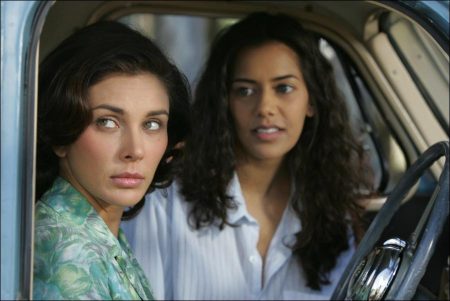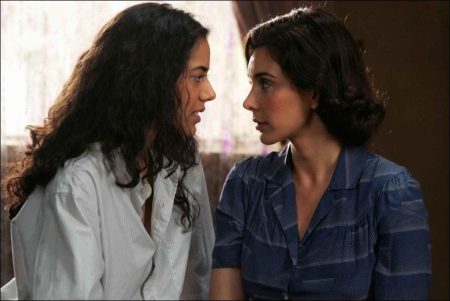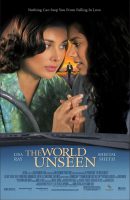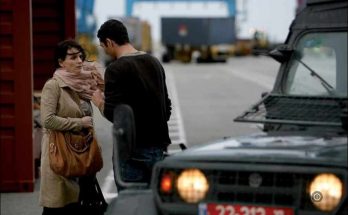Taglines: Nothing can stop you from falling in love.
The World Unseen movie storyline. In 1950s South Africa, a land torn apart by apartheid, Amina epitomizes individuality and freedom. She runs the Location Café, a haven of fun, food, and festivities open to all. Amina defines her own laws and lives on her own terms undeterred by the reproving police and the disparaging Indian community.
Miriam demurely follows conventions and makes no demands on life. Her world is confined to being a doting mother to her three children and a subservient wife to her chauvinistic husband Omar. Amina has a covert business partner, Jacob, who is barred from owning a business because he is ‘coloured.’ He fancies Madeleine, a local white postmistress, but the indignities and injustices of the prevalent law thwart their desire to pursue a relationship.
Omar’s sister Rehmat married a white man against rules that forbid mixed marriages. When she needs protection from police, Amina shelters her, and her charm and strength of character captivate Miriam, who secretly rejoices when Amina accepts a farming job in her backyard. Amina notices Miriam’s inherent kindness and silent dedication, and the mutual attraction between them grows. They bare their hearts to each other and their emotions get entangled. They contrive another reason to meet: driving lessons.
The inescapable social distance between them makes them question their feelings, but in the midst of hatred and oppression their only refuge is love. In the resplendent South African landscape with retro music strewn in the background, The World Unseen explores Miriam’s relationship with Amina and how it empowers her to make personal choices that change her world.
The World Unseen is a historical drama film written and directed by Shamim Sarif, adapted from her own novel. The film is set in 1950s Cape Town, South Africa during the beginning of apartheid. The film stars Lisa Ray and Sheetal Sheth as two Indian South African women who fall in love in a racist, sexist, and homophobic society.
Ray and Sheth also star together in another Shamim Sarif movie, I Can’t Think Straight, released in November 2007. The World Unseen was made with the assistance of the National Film and Video Foundation of South Africa, which took a minority equity stake in the film.
Film Review for The World Unseen
The World Unseen is a film that benefits from an auteurship rarely seen in modern film: It was written and directed by Shamim Sarif (pictured above), author of the novel on which the film is based. The resulting product is a quintessential labor of love, and a successful one at that.
The movie follows the story of two Indian–South African women who fall in love in the racist, sexist society of apartheid South Africa in 1952. Featuring excellent performances from leads Lisa Ray and Sheetal Sheth, the movie is a charming, well-crafted period drama done right.
The film opens with the vivacious Amina (Sheth), owner of the Locomotion Café (a nod to the Whistle Stop Café of Fried Green Tomatoes, perhaps?), as she fixes up her shop. Amina dresses in men’s clothing, defies the local police as they come in to harass the Africans working in the café, and generally takes no guff from anyone.
Shortly thereafter, the viewer is introduced to Miriam (Ray), a pregnant, subservient housewife living with her family in nearby Cape Town. When her husband allows her to travel to the café one day, Miriam meets Amina, and the sparks (along with a few pastries) fly.
Miriam soon moves to the countryside, and the ever-handy Amina offers to build a garden in her yard. Amina uses the experience to get to know Miriam, bonding over evening tea, discussing her grandmother (a rape victim who was thrown out of the family) and the oppression of marriage and apartheid.
When Amina hints at her sexuality, testing the waters, Miriam is conflicted. Inspired by Amina’s independent spirit but unsure of how to proceed, she stalls.
Amina displays her nonconformist spirit at a family dinner — much to the chagrin of her traditional grandmother, who orchestrates the event to showcase Amina as a marriage prospect. And Amina again shows her stripes when she defies the police and protects Miriam’s visiting sister-in-law from arrest, saving the day for Miriam’s family.
Miriam’s own defiance and strength begin to surface when she tries to save an injured African man. Unfortunately, her husband doesn’t share her progressive attitudes. He begins treating her with increasing paranoia and violence, even as he carries on an illicit affair with his brother’s vampy wife.
Throughout the drama, Amina and Miriam slowly fall for one another. The sexual tension and chemistry are palpable as long glances give way to lingering touches, and finally, a kiss. The central dramatic question from this moment forward pits Amina’s boldness against Miriam’s love for her family and her place in the world as she knows it: Can they ever make it work?
The film is presented as both a slice of life and an epic romance — all within the context of a highly sexist, racist society. The drama runs thick, and the film provides commentary on everything from the oppression of marriage, rape, and sexism in Indian culture to racism in South African society. But The World Unseen manages to avoid buckling under its own weight, thanks to excellent performances and wonderful chemistry between the two leads.
Sheth’s Amina is amazingly buoyant and infinitely likable. She asserts her identity and fights for what she believes in without losing her cool or her playful sense of humor.
Ray brings a wonderful strength to Miriam — despite her position as a submissive wife and mother — and there is a deep undercurrent of nerve and repressed force in her character. Other actors do admirably in their roles, especially David Dennis as Amina’s kindly business partner Jacob. But this is definitely Ray and Sheth’s show.
The World Unseen (2007)
Directed by: Shamim Sarif
Starring: Lisa Ray, Sheetal Sheth, Parvin Dabas, Nandana Sen, David Dennis, Natalie Becker, Colin Moss, Avantika Akerkar, Amber Rose Revah, Leonie Casanova, Roderick Priestley
Screenplay by: Shamim Sarif
Production Design by: Tanya Van Tonder
Cinematography by: Michael Downie
Film Editing by: David Martin
Costume Design by: Danielle Knox
Music by: Richard Blackford
MPAA Rating: PG-13 for mature thematic material involving sexuality, and violence.
Distributed by: Regent Releasing
Release Date: September 15, 2007
Views: 85






